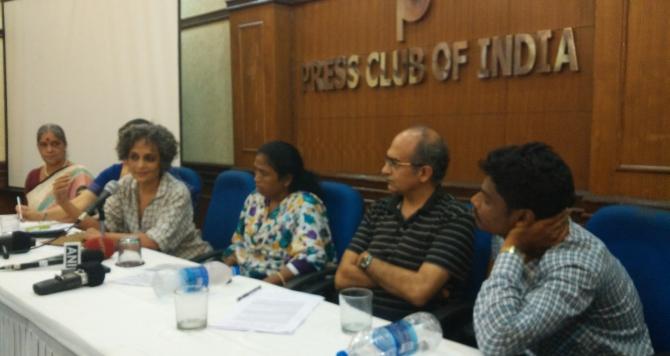
'Adivasis are a critical national treasure, so we need to protect them.'
'The fight for the tribals of Chhattisgarh needs people from all political parties. It cannot be about any single political group.'
Upasna Pandey reports for Rediff.com
"Either we will be arrested again by the Chhattisgarh police or we will be killed," tribal activist Soni Sori told a press conference in Delhi earlier this week.
"But we won't stop our work," she added.
"I feel a lot of anger and anguish over not getting justice until now in my own case," Soni -- the victim of alleged police brutality after she was arrested in 2011 -- said, adding, "I continue to suffer both mentally and physically as a result of police brutality. I am not giving up hope and will wait for justice."
"Right now, I am focussing on the fight for the villagers of my area. This is also a way of getting justice for me," she added.
According to reports, Bastar Inspector General of Police S R P Kalluri recently issued a call for the excommunication of Soni, Lingaram and others working with them from the community. The Dantewada superintendent of police has also allegedly threatened residents of Nahadi village and asked them not to work with Soni.
"In Geedam town, where I live, a trader was killed by a villager. Following that incident, Dantewada's IG and SP told the traders that I was a Maoist sympathiser and was responsible for his death," Soni said.
"The fight for the tribals of Chhattisgarh needs people from all political parties. It cannot be about any single political group," she added.
Soni hopes to petition the National Human Rights Commission to probe Kalluri and the Bastar administration. "They (the police and administration) cannot remove me from Bastar -- it is my birthplace," she said.
Lingaram Kodopi, her nephew, has studied journalism, and works on documenting such incidents, with a focus on fake encounters. "Villagers across the state call me as soon as there is any such incident. I visit the spot and try to document the incident so we can get the facts right."
"There are fake encounters, police torture and harassment of villagers as well as long detention and false charges under anti-Naxal provisions," lawyer Prashant Bhushan told the press conference.
"Adivasis are a critical national treasure and stand for sustainable life and environment conservation, so we need to protect them," he added.
"I have confidence in the people of India for supporting me in my fight," Soni told Rediff.com
Soni was arrested by the Delhi police crime branch in 2011 on charges of acting as a conduit for the Maoists. During her imprisonment, Soni stated that she was tortured and sexually assaulted by the Chhattisgarh police. By April 2013, she was acquitted in six of the eight cases filed against her due to lack of evidence.
"This is a deep struggle about driving Adivasis out of their natural environment," writer Arundhati Roy said, "so that the large scale commercial interests of setting up of steel plants by giants such as Essar and Tata can be achieved."
"The police is being trained like the army in Chhattisgarh, and anyone who raises a voice against harassment and atrocities is branded a Maoist," she added.
Vrinda Grover, the lawyer who represented Soni felt, "The redressal mechanisms through political, police and legal structures are failing in the state."
According to the National Crimes Records Bureau report for the period 2009 to 2014, Grover pointed out, Chhattisgarh has the most crowded prisons as well as the highest number of undertrials.
"For instance, there are 400 prisoners lodged in a 66-person capacity jail," Grover revealed, "so they sleep only for two hours in shifts at night."
"In all the Naxal cases, there is no bail for the prisoners, and they remain in jail for long periods and finally get acquitted in absence of evidence," she said. "In fake encounter cases, there is no proper mechanism for an independent inquiry to ascertain the reality."
Image: From left: Arundhati Roy, Soni Sori, Prashant Bhushan and Lingaram Kodopi. Photograph courtesy: Twitter










